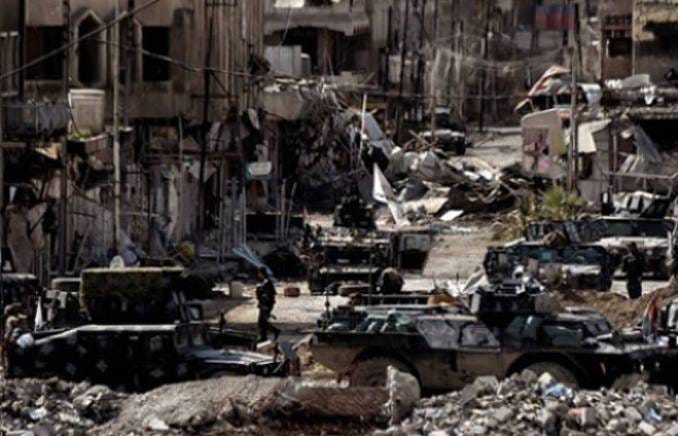
Mosul, HMAD AL-RUBAYE/AFP/Getty Images
In a collapsing world, replete with apocalyptic imagery, nothing much hung by it.
Old Alex had tried and failed, that had been the dominating feeling throughout life.
He had told a psychiatrist once, and she had responded: "But you're in the newspaper today. I just read your piece. It's beautifully written."
But Old Alex had never succeeded in what he wanted to do, and journalism had been a leitmotif, a trap demanding time and energy, driven by money and a creative impulse, well sometimes, but in the end it was just about providing a stable environment for his kids.
And so the years rolled by and he found himself abandoned on a side road, sandy, rubbish from the highway accruing in corners, giant trucks roaring past, down the nearby New England highway.
He could see them from where he stood.
Their wind caught him. His imagination soared.
But he was still on a side road.
Trapped in a backwater. Surrounded by thickets. They might as well have been prison bars. He remembered those years of the Inquisition. He remembered the dismal conditions and the pain. How desperate he had been to escape.
In the 21st Century, the surveillance which he had found so extremely disturbing, an outlandish and prolonged level of state funded abuse, along with the volunteers and the hunters and the easily stirred, providing a straight, central entry point into not just the dark nature of the state but the fluid, easily manipulated state of the society.
It was a perfect petri dish for fomenting disaster, a societal wide train wreck.
In amidst the surrounding seaweed, the dreaming suburbs, one of the soldiers recalled a sandstorm in Iraq.
Old Alex woke up muttering, as he had done so often: "Surveillance is harassment. And I have been very, very badly harassed."
But the high-tech weaponry, the government employed empaths, their various intrusive experts; and plain old pain-in-the-ass liberals and their side-kick thugs, foot soldiers for a greater evil, they had all moved on.
A janitor swept the corners of an empty warehouse.
Another era beckoned.
"I want to live with you," a man said in the heat, the heart of the moment. And was gone five minutes later.
"You can come with us," the spirits said. "We're going now."
"I want to stay on this planet," he said. "I feel obligated."
And they were gone. Another escape route closed.
They might come back for him. They very well might not.
THE BIGGER STORY:
How ISIL nearly stumbled on the ingredients for a 'dirty bomb' in Mosul

On the day ISIL overran the Iraqi city of Mosul in 2014, it laid claim to one of the greatest weapons bonanzas ever to fall to a terrorist group: a large metropolis dotted with military bases and garrisons stocked with guns, bombs, rockets and even battle tanks.
But the most fearsome weapon in Mosul on that day was never used by the terrorists. Only now is it becoming clear what happened to it.
Locked away in a storage room on a Mosul college campus were two caches of cobalt-60, a metallic substance with lethally high levels of radiation. When contained within the heavy shielding of a radiotherapy machine, cobalt-60 is used to kill cancer cells. In terrorists’ hands, it is the core ingredient of a “dirty bomb,” a weapon that could be used to spread radiation and panic.
Western intelligence agencies were aware of the cobalt and watched anxiously for three years for signs that the militants might try to use it. Those concerns intensified in late 2014 when ISIL officials boasted of obtaining radioactive material, and again early last year when the terrorists took over laboratories at the same Mosul college campus with the apparent aim of building new kinds of weapons.
REFUGEES: ADVOCATES AND PROPAGANDA FROM ALL SIDES

The United Nations' refugee agency has accused the Federal Government of a breach of trust over the United States refugee deal, saying it has broken a promise to resettle refugees with close family ties to Australia.
The UN High Commissioner for Refugees (UNHCR), Filippo Grandi, said the organisation had "exceptionally" agreed to help resettle refugees on Nauru and Manus Island in the US because of the "dire" humanitarian situation they faced.
"We agreed to do so on the clear understanding that vulnerable refugees with close family ties in Australia would ultimately be allowed to settle there," Mr Grandi said.
"[But] UNHCR has recently been informed by Australia that it refuses to accept even these refugees.
"This means, for example, that some with serious medical conditions, or who have undergone traumatic experiences, including sexual violence, cannot receive the support of their close family members residing in Australia."



